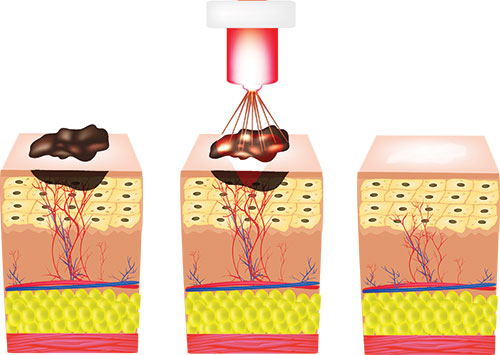Warts – small ugly growths that appear on the outer layer of skin – are caused by an infection of the skin after contracting the human papillomavirus (HPV). Warts are extremely common and can be extremely stubborn. Different strains of HPV cause different types of warts that can appear anywhere on the body but are usually found on hands, feet, legs, genitalia, and face.
TREATMENT OPTIONS FOR WARTS
At our office, we use many different techniques to remove warts from any place on the body. We use chemical and non-chemical treatments, depending on the type and severity of the wart.
Cryotherapy (freezing warts off)
In our practice, WE TREAT AND REMOVE WARTS EVERY DAY, as they are extremely common. A lot of these cases respond well to Cryotherapy and this is the typical first line of treatment. Warts are frozen with liquid nitrogen at a temperature of -196 Celsius. This creates a blister that falls off within 1-2 weeks.
Our practice also sees many cases of STUBBORN WARTS. These are warts that keep returning, grow resistant to Cryotherapy, or do not respond to it at all…
STUBBORN WARTS
Warts can be stubborn and hard to remove. Often times, patients need to treat warts at home after in-office removal treatment. Dr. Todd Minars created an easy to use step-by-step guide for all patients to follow after having an in-office wart removal treatment. Below are each of our providers’ favorite techniques for treating those stubborn warts:
The V-Beam Vascular Laser
Dr. Norman Minars’ tool of choice. The V-Beam is a pulsed-dye laser that’s used to treat any condition that is caused by a vascular condition. It’s a quick procedure that uses heat to destroy the wart, by destroying the blood vessels that are feeding it.
Shave it off
This is Dr. Todd Minars’ preferred method. “It’s clean and it’s surgical,” he says. After injecting the wart with lidocaine, he removes the wart with a scalpel or razor.
Candida Antigen Immunotherapy
Marianna Helin, ARNP, uses this approach. The idea behind this treatment is to stimulate an immunologic response so your body can fight off HPV. A small amount of the dead yeast is injected directly into the wart to build your body’s immune response to fight the virus. This method has been very successful with stubborn warts and leaves no scarring.
Bleomycin
Dr. Ran Huo specializes in treating warts with Bleomycin, a cancer chemotherapy drug that gets injected in tiny dilute amounts directly into the warts. It has a high success rate, but it can sometimes be painful. It is the last resort for warts that are resistant to all other treatments and is not suitable for children, pregnant women, or people who have vascular conditions.
WHY ARE SOME CASES HARDER TO TREAT THAN OTHERS?
“We don’t know,” says Dr. Todd Minars. “Some people who are perfectly healthy and are in no way immunocompromised have immune systems that just aren’t very good at clearing HPV. It is like a small immunologic blind spot.”
There is no elegant “magic bullet” (like a pill) to treat the HPV virus. The way to treat warts is to destroy and get rid of the infected wart tissue itself. When recurrent infection causes repeat cases of warts, our team will tackle them with one of the more aggressive, specialized methods at our disposal. “It can take time to get rid of these types of stubborn warts,” Dr. Todd explains. “What worked during a patient’s last outbreak might not work the next time. The best way to remove warts in the fastest way possible is to have a number of expert and advanced options to choose from.”
TREATING CHILDREN WITH WARTS
Cantharidin (“Beetlejuice”)
Our practice treats many children with warts, and we have a painless technique that we use on many of them. Cantharidin is a liquid medication derived from a blister beetle. The Beetlejuice (as we like to call it) causes blistering, which kills off the wart. We apply it directly to the wart and leave it to dry. In 3 to 4 hours, parents can wash it off at home with soap and water. There may be some redness or tenderness in the first 2-3 days after treatment. The affected area will then heal within 1 to 2 weeks.
CALL US TODAY
If you have a wart that you want removed, call us to book your consultation. Over-the-counter wart removal techniques won’t work on every wart – it’s always best to consult with a professional.
[getfivestars_widget id=”2″]Wart Diagnosis & Treatment Frequently Asked Questions
Here are some questions that we are frequently asked about warts, their diagnosis, and treatment. As always, this information is provided to you for educational purposes – if you have any questions, please feel free to contact our office!
How do you stop warts from spreading?
Warts are spread through direct contact. So try to minimize touching warts; wash your hands whenever you touch warts. You can also cover warts with a bandaid and above all treat the wart (if it is no longer there, it can no longer spread.)
Are all warts caused by HPV?
Yes.
Does having a wart mean you have HPV?
By definition “yes”. But HPV is usually just a local infection in the skin (i.e. the wart itself). It can also infect other mucous membranes (e.g. cervix in woman). But just because you have a wart on your hand, it does not mean you “have HPV” anywhere else (like the cervix or mouth etc..)
Can men have HPV?
Yes. All warts are caused by HPV.
Are plantar warts caused by HPV?
Yes. All warts are caused by HPV. Sometimes the term “HPV” is used to imply cervical HPV in women. But HPV is “human papilloma virus” and every wart is caused by a localized infection with HPV. But HPV that causes a wart on the plantar surface of your foot (i.e. plantar wart). Does not imply or make you any more likely to have “cervical HPV”.
Do plantar warts have a root?
Warts don’t really have “roots”. Warts are localized HPV infection of the epidermis (the top layer of the skin). An “endophytic” wart can grow inwards pushing into the dermis but they are still fairly well-circumscribed (and lack “tentacles” or “plant-like roots”)











